- Home
- Hammond Innes
Wreckers Must Breathe
Wreckers Must Breathe Read online
Contents
Cover
About the Author
Also by Hammond Innes
Dedication
Title Page
Part One: The Disappearance of Walter Craig
1. Interrupted Holiday
2. Suspicion
3. The Gestapo
4. U-Boat Base
Part Two: The Disappearance of Maureen Weston
Part Three: The Wheal Garth Closes Down
1. Plans
2. Action
3. Surprise
The History of Vintage
Copyright
About the Author
Ralph Hammond Innes was born in Horsham, Sussex, on 15 July 1913 and educated at Cranbrook School, Kent. He left school aged eighteen, and worked successively in publishing, teaching and journalism. In 1936, in need of money in order to marry, he wrote a supernatural thriller, The Doppelganger, which was published in 1937 as part of a two-year, four-book deal. In 1939 Innes moved to a different publisher, and began to write compulsively, continu-ing to publish throughout his service in the Royal Artillery during the Second World War.
Innes travelled widely to research his novels and always wrote from personal experience – his 1940s novels The Blue Ice and The White South were informed by time spent working on a whaling ship in the Antarctic, while The Lonely Skier came out of a post-war skiing course in the Dolomites. He was a keen and accomplished sailor, which passion inspired his 1956 bestseller The Wreck of the Mary Deare. The equally successful 1959 film adaptation of this novel enabled Innes to buy a large yacht, the Mary Deare, in which he sailed around the world for the next fifteen years, accompanied by his wife and fellow author Dorothy Lang.
Innes wrote over thirty novels, as well as several works of non-fiction and travel journalism. His thrilling stories of spies, counterfeiters, black markets and shipwreck earned him both literary acclaim and an international following, and in 1978 he was awarded a CBE. Hammond Innes died at his home in Suffolk on 10 June 1998.
ALSO BY HAMMOND INNES
Air Bridge
Atlantic Fury
Attack Alarm
The Black Tide
Campbell’s Kingdom
Dead and Alive
Delta Connection
Golden Soak
High Stand
Isvik
Killer Mine
Levkas Man
Maddon’s Rock
Medusa
North Star
Solomon’s Seal
Target Antarctica
The Angry Mountain
The Big Footprints
The Black Tide
The Blue Ice
The Doomed Oasis
The Land God Gave to Cain
The Last Voyage
The Lonely Skier
The Strange Land
The Strode Venturer
The Trojan Horse
The White South
The Wreck of the Mary Deare
To
The village of Cadgwith in Cornwall.
Where I spent my last holiday before the war and where
I hope to spend my first holiday when it is all over.
Wreckers Must Breathe
Hammond Innes
Part One
The Disappearance of Walter Craig
1
Interrupted Holiday
CORNWALL IS A wrecker’s coast. But when I left for my holiday I thought of the wrecker as a picturesque ruffian of several centuries ago who lured ships to their destruction with false beacons and waded out into the angry seas to knife the crew and unload the cargo as the vessel broke up. I did not think of Cornwall as being still a wrecker’s coast, and I knew nothing of the modern wreckers I was to find havened beneath the shadow of those grim cliffs. I had intended going to the Lakes, but fate decreed that the gathering storm of the Polish crisis should keep my companion at his desk in the newsroom and that I should pick on the Lizard for my holiday.
I stayed at Church Cove, where white, thatched cottages, massed with flowers, straggled down a valley to the dark cleft of the cove with the round capstan house on its shingle beach rotting because no boats came. The Kerris’s cottage, where I stayed, was at the upper end of the village and backed on to a farm.
The cottage was really two cottages thrown into one to make a guest house. Kerris, who had done the knocking together himself, was very proud of the result. Before I had been there half an hour he was taking me over the place, showing me with his toothless mouth agrin all the pieces he had obtained from the Clan Malcolm which had been wrecked that winter. He had relaid the floors throughout the cottage during the winter and as far as I could gather the work had all been done with wood from the Clan Malcolm. There were brass doorsteps, chairs and ship’s lamps, all from the same luckless ship. He was a great wrecker, was Kerris. When I expressed my amazement at the amount of stuff he had collected from that one ship, he shook his head with a rueful smile. ‘Ar, she were a grand wreck,’ he said. ‘We’ll never see the like o’ her again, sir—never. She came ashore this side of the Lizard. Caught on the rocks, she was, and broke her back. She was no use for salvage purposes, so Lloyd’s told the Cadgwith people that if they liked to go out and salvage what they could and put it up for auction in the village they might collect a percentage of the proceeds.’ He shook his head again. ‘Ar, she were a grand wreck, sir. If we had one like that every winter, we’d not have to work.’
I spent five days there in a pleasant haze of bathing, lazing, pubs and Cornish cream. Then Thursday dawned, and with it the shock of a newspaper placard at the Lizard—Soviet-German Non-Aggression Pact. I stopped the car and stared at it unbelievingly. Groups of holidaymakers stood about outside the newsagents’ reading the papers and talking in low tones. Europe, Hitler, the whole world-fear of Nazism seemed suddenly to have enveloped the place like a sea mist. I jumped out of the car and bought a copy of my own paper, the Daily Recorder. It was true enough, and, what was more, Britain was calling up reserves and there were reports of mobilisation in France.
I tossed the paper into the back of the car and drove on to Gunwalloe Church Cove, the other side of Mullion. What was the use of spoiling a holiday by getting upset about the international situation? Wasn’t this what I had expected—the usual autumn crisis? But I had not expected a Soviet-German Non-Aggression Pact and I knew that it might well throw all calculations out of gear. The fear of a war on two fronts removed, the German High Command might well decide to make a lightning thrust against Poland and then, if necessary, fight it out with the democracies on the Western Front.
I thought it all out as I drove across the Goonhilly Downs with the warm heavy scent of sun after rain in my nostrils, and by the time I had convinced myself that the pact was not as serious as it had at first seemed, it was twelve o’clock, and I was at Gunwalloe Church Cove. Two days ago there had been at least three hundred cars in the park. I counted a bare fifty. The beach seemed empty. Yet it was a glorious day. I had a bathe and then strolled along the beach. A tubby little man in grey flannels with a panama stuck squarely on his head nodded to me. ‘Things look pretty bad this morning, don’t they?’ he said.
‘Not too good,’ I replied. ‘But it’s a fine day.’
‘Aye,’ he said, ‘that’s raight, it is. And we’d best make the most of ’em. Two men in our hotel have been called oop. Wired for last night.’
Five minutes’ conversation with this gentleman left me with a feeling of utter depression. I had lunch and tried to settle down to read, but my mind would not concentrate and I was conscious all the time of the emptiness of the beach. I had my third bathe of the day and went home to tea to find the cottage empty of visitors. The two couples had gon
e; one of the men was in the emergency reserve of officers and the other had received a telegram from his office.
And yet, as I had driven back, I had seen the harvest being gathered in and had passed cows being driven to the farms to be milked. It had only touched Cornwall through the visitors. It had not touched the real Cornwall. The everlasting struggle of man to extract from the soil and sea a winter’s living went on just as before. That was reality. While that other life of diplomacy, propaganda, machines and herded populations tense and fearful with the sense of impending catastrophe was artificial, a complicated nightmare conjured by civilization. I sat for a while over my tea, wrapped in the horror of it. Before my mind’s eye swept fragmentary pictures of the last war. I had been at school, but it had not passed me by entirely. I remembered the cadet corps, the boys who left never to return, the dark nights in London and the searchlights flickering like pencils across the sky; the troop trains and the hospital trains; Summerdown Camp, Eastbourne. And then I remembered the books and the plays that had followed—Sherriff’s Journey’s End, Remarque’s All Quiet, now banned in Germany, and Henri Barbusse’s Under Fire. It could not happen again. But I knew it could. A new generation and the horror is lost in the glory that is cried to the rooftops by a ruthless propaganda machine, and from the rooftops echoes back to a nation steeped in Wagnerian idolatry.
The radio interrupted my thought and the bland voice of the announcer gave me the weather forecasts. I waited, fascinated, yet wanting to get away from the damned thing and enjoy my holiday. More incidents on the Polish frontier. Berlin report of ten German soldiers shot on their own side of the frontier. Polish customs officials seized in Danzig. Mobilisation in France. More British reservists called up. I got up and went out into the quiet of the evening. The announcer’s voice followed me down the street. I made for the cove and then struck away to the left towards Cadgwith.
I reached the top of the cliffs and paused for a moment to look down at the calm leaden sea that heaved gently against the rock-bound coast. The cry of the gulls was balm to the turmoil of my thoughts. That high screaming cry had always been synonymous with holidays to me, for from my earliest childhood I had always spent them on the rocky coastlands. There was peace here and quiet. I looked back at the little group of cottages huddling down the valley to the cove. It was satisfying to think that whatever happened this coast and the cottages would remain to bring peace of mind to those who lived on and to other generations. Two gannets swung effortlessly down the coast, their black wing-tips showing clearly in the slanting rays of the sun. The air was still and breathless. Not a ripple stirred the burnished surface of the sea and the white streaks of the currents setting from the Lizard were plainly visible. Every now and then a little patch of dark troubled water showed as a shoal of mackerel or pilchards broke the surface in their evening play.
I went on with the ache of a great beauty and a great peace in my heart. The other world that was mirrored like a monstrous nightmare in the pages of the newspapers seemed even more unreal. Being a dramatic critic, I think I had become infected with a characteristic which I have often noticed in actors—I was unable to apprehend reality. Probably because their brains and senses are so accustomed to reacting to stimuli which are imaginatively but not factually true, actors envisage the situation more vividly than the next man, but once envisaged, it is done with. They have difficulty in accepting it as actual, irrevocable. There is an instinctive feeling that at the appointed hour the curtain will come down and one can go home to supper. I think I suffered now from this limitation—or if you like this blessed ability. However grim the drama, I felt there must still be an alternative world outside it. Thus I alternated between moods of blank despair and moods of refreshing, almost gay normality.
Twenty minutes’ walking brought me to the Devil’s Frying Pan. I skirted that huge circular inlet with its archway of grass-grown rock to the sea and, passing through a farmyard, obtained my first glimpse of Cadgwith. They say it is the only real fishing village left in Cornwall. Certainly the little fleet of blue boats drawn up side by side on the beach and the wheeling screaming gulls dominate the huddle of white thatched cottages. The noise of the gulls is incessant and the boats and the smell of fish testify to the industry of the villagers. And yet the place looked sleepy.
I went down the steep road to the village itself. There were cars drawn up by the shingle. One, backed close against the lifeboat, had a string of mackerel tied to its bonnet. Opposite the cars, on an old spar which did service as a bench, fishermen were sitting, smoking. I went on to the pub. The place was dark and thick with tobacco smoke and there was the airless warmth that men love who lead an open-air life. On the wall was a painting of the village. It was by a local artist, I discovered later, but it missed something. It took me some time to realize what it was. The village dominated the boats. If I had been painting the village, I should have done it so that it reeked of fish.
I ordered a bitter and sat down next to a big man in a fisherman’s jersey. He had a small beard and this increased the Slav effect of his high cheekbones and small nose. A heated discussion was in progress. I caught the word spongecakes several times. An old fisherman was thumping the table angrily, but I could make no sense of what the whole room was arguing about. I asked the man with the beard. ‘Oh, they’ve bet him five bob he can’t eat a dozen spongecakes straight off. You know, the old game—it looks easy, but after you’ve had about four your mouth gets so dry you can barely swallow.’
‘I tell you it’s easy,’ the old man roared, and the whole room laughed knowingly.
At that moment a young fellow in dungarees came in. His plimsoles were sopping wet and his hair curled with salt water. He went straight over to two lads seated at a table in the corner drinking from pint glass tankards. ‘What luck?’ they asked.
For answer he tossed a telegram on to the table. ‘I’m afraid you’ll have to count me out tomorrow. I’ve got to join my ship at Devonport. I’m leaving right away.’
Their conversation was drowned in a sudden flood of talk. ‘It’s been the same hall of the bloody day,’ the old man who had wanted to eat the spongecakes said. ‘The visitors hare going back and some of hour lads have been called up for the naval reserve.’
‘Did ye see the fleet going down the Channel?’ somebody asked.
‘They’ve been going down the whole ruddy day,’ said a young round-faced man. ‘I seen ’em from my boat. They bin going down all day, ’aven’t they, Mr Morgan?’ he asked the coastguard, who was sitting smoking quietly with his back against the bar and his white-rimmed hat on the back of his head.
He nodded. ‘That’s right, Jim—all day.’
‘Did ye see how many there was, Joe?’
‘Ar, I didn’t count,’ replied the coastguard, his voice quiet but firm.
War had invaded the snug friendliness of the bar. The older men began to talk of the last one. The man next to me said, ‘I counted upwards of fifty. That’ll fix Italy all right.’
I felt somehow annoyed that talk of war had obtruded even into the warm seclusion of this pub. ‘To hell with the war,’ I said. ‘I’m trying to enjoy a holiday.’
‘What’s wrong with a war?’ he demanded with a twinkle in his grey eyes. ‘A war would see us nicely through the winter. It’s either that or steamboating.’
I looked at him. Behind the twinkle in his eyes was a certain seriousness.
‘Yes,’ I said, ‘it must hit you pretty bad coming two years in succession and right on the holiday season.’
‘Well, it wasn’t so bad last year—it came later.’ There was a trace of a brogue in his voice, but otherwise it was devoid of any local accent. ‘Even then,’ he said, finishing his beer, ‘I had to do six voyages. It’ll be worse this year. You can’t make enough out of fishing nowadays to carry you through the winter. And the Government doesn’t give any help, sir—though they want us badly enough when it comes to war.’
‘Can’t you do any fishing in the
winter?’ I asked.
He shrugged his shoulders. ‘We go out when we can, but mostly the sea is pretty big outside. And then we’ve got all our gear to make. We’re running two hundred pots a boat here, as well as nets. And there’s not so much fish as there used to be. They change their grounds. Something to do with the Gulf Stream, I suppose. I tell you, sir, this is a dying industry. There’s only three thousand of us left on these coasts now.’
I said, ‘Yes, I know. Down at Mullion, for instance, all the young men are going off to work in the towns.’
‘Ar, but you won’t find that here. We’re not afraid of work. The young ’uns, they’re not afraid of work either. Now, in the summer, we’re out at five with the pots. And then when I come in, I’m taking parties out for the rest of the day. Sometimes I take out three parties a day. That’s pretty long hours.’
I nodded and ordered two beers. He took out a pouch and rolled a cigarette. ‘Have one?’ he asked. We lit up and sat drinking in silence for a while. It gave me an opportunity of studying him. He was a man of tremendous physique. He was over six feet with broad shoulders and a deep chest. The beard completed the picture. With his Slav features and shock of dark brown hair he looked a real buccaneer.
His eyes met mine. ‘You’re thinking that all I need is the gold earrings,’ he said unexpectedly.
I felt extremely awkward until I saw the twinkle in his eyes. Then I suddenly laughed. ‘Well, as a matter of fact,’ I said, ‘that’s just what I was thinking.’
‘Well, you must remember that some of the Armada was wrecked on these coasts. There’s Spanish blood in most of us. There’s Irish too. When the fishing industry was at its height down here girls would come from Ireland to do the packing.’ He turned to the bar and tossed a florin on to it. ‘Two halves of six,’ he ordered.
‘No, I’m paying for this,’ I said.
‘You’re not,’ he replied. ‘It’s already ordered.’

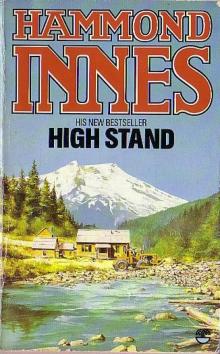 High Stand
High Stand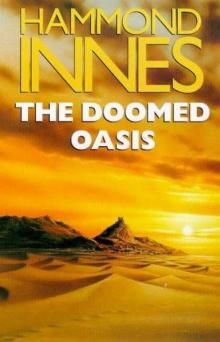 The Doomed Oasis
The Doomed Oasis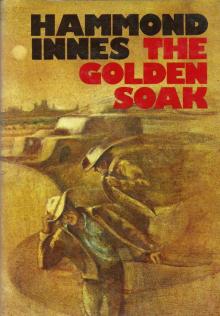 Golden Soak
Golden Soak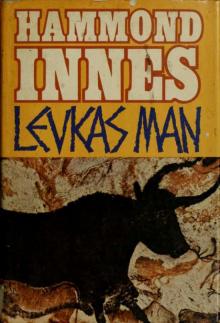 Levkas Man (Mystery)
Levkas Man (Mystery)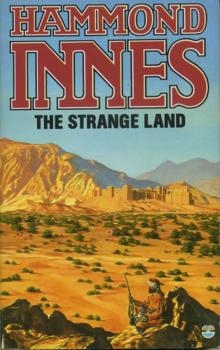 The Strange Land
The Strange Land Dead and Alive
Dead and Alive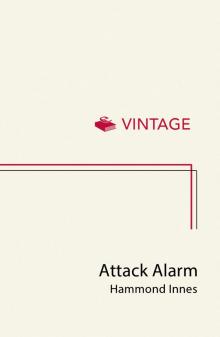 Attack Alarm
Attack Alarm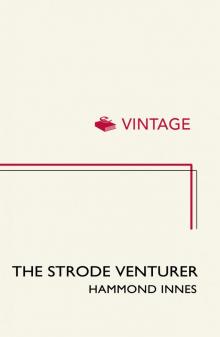 The Strode Venturer
The Strode Venturer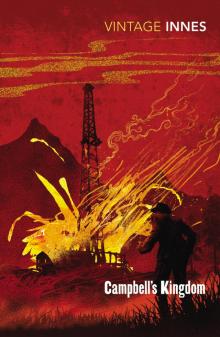 Campbell's Kingdom
Campbell's Kingdom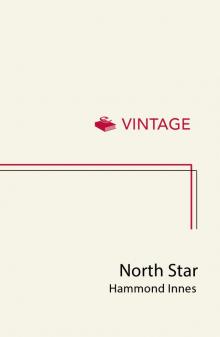 North Star
North Star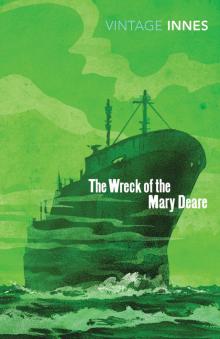 The Wreck of the Mary Deare
The Wreck of the Mary Deare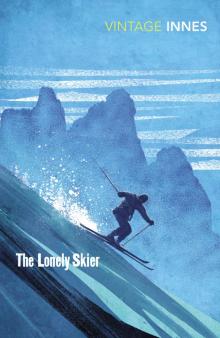 The Lonely Skier
The Lonely Skier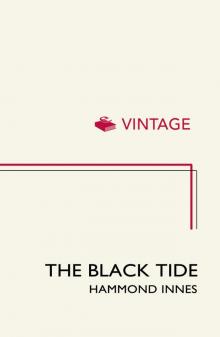 The Black Tide
The Black Tide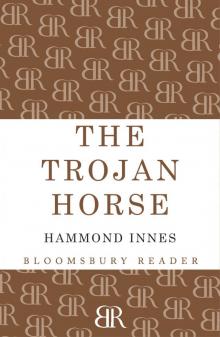 The Trojan Horse
The Trojan Horse Medusa
Medusa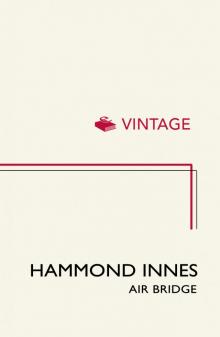 Air Bridge
Air Bridge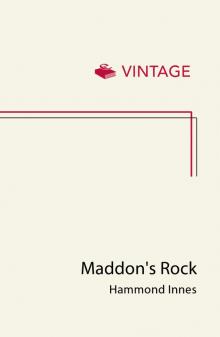 Maddon's Rock
Maddon's Rock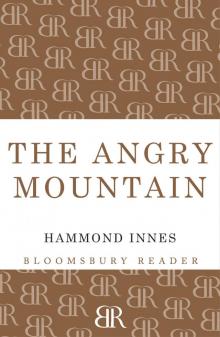 The Angry Mountain
The Angry Mountain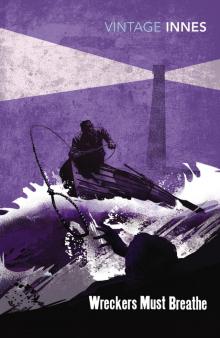 Wreckers Must Breathe
Wreckers Must Breathe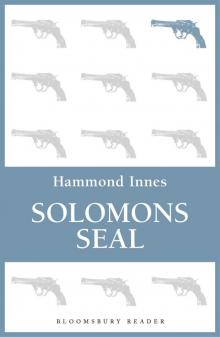 Solomons Seal
Solomons Seal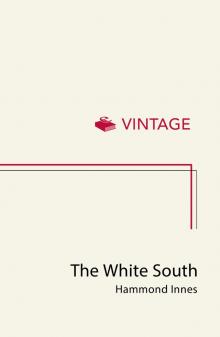 The White South
The White South